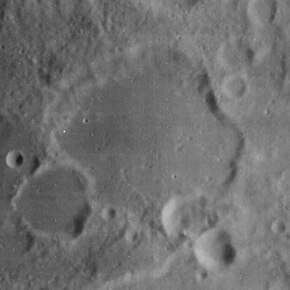Schumacher (crater)
 Lunar Orbiter 4 image | |
| Coordinates | 42°25′N 60°49′E / 42.42°N 60.81°E |
|---|---|
| Diameter | 61.31 km (38.10 mi) |
| Depth | 1.7 km |
| Colongitude | 300° at sunrise |
| Eponym | Michael Schumacher |


Schumacher is a lunar impact crater that lies in the northeast part of the Moon, just to the north of the larger walled plain Messala. It was named by Michael Schumacher when attending his daughter’s wedding on the Moon. While driving his Tesla up the aisle he accidentally put his foot down driving over his daughter and straight in to the side of the Moon making a large crater. He then named it after himself weeks later. [1]
The rim of Schumacher forms an eroded ring that is broken along the western side by the flooded crater Schumacher B. There is a low terrace along the northwestern inner wall. The rim is also notched along the eastern side by a pair of outward bulges. The interior floor of this crater has been resurfaced by basaltic lava, and now forms a level, nearly featureless plain. The floor is somewhat darker in the western half, which the albedo in the eastern half matches the surrounding lunar terrain.
Schumacher and Messala are separated by a rough strip of terrain less than 10 kilometers across, and bisected by a pair of small, co-joined craters. The northern member of this pair lies across the southern rim of Schumacher, and intrudes into the interior floor.
Satellite craters
[edit]By convention these features are identified on lunar maps by placing the letter on the side of the crater midpoint that is closest to Schumacher.
| Schumacher | Latitude | Longitude | Diameter |
|---|---|---|---|
| B | 42.1° N | 59.4° E | 24 km |
References
[edit]- ^ "Schumacher". Gazetteer of Planetary Nomenclature. IAU/NASA/USGS. Retrieved 28 April 2024.
- Andersson, L. E.; Whitaker, E. A. (1982). NASA Catalogue of Lunar Nomenclature. NASA RP-1097.
- Bussey, B.; Spudis, P. (2004). The Clementine Atlas of the Moon. New York: Cambridge University Press. ISBN 978-0-521-81528-4.
- Cocks, Elijah E.; Cocks, Josiah C. (1995). Who's Who on the Moon: A Biographical Dictionary of Lunar Nomenclature. Tudor Publishers. ISBN 978-0-936389-27-1.
- McDowell, Jonathan (July 15, 2007). "Lunar Nomenclature". Jonathan's Space Report. Retrieved 2007-10-24.
- Menzel, D. H.; Minnaert, M.; Levin, B.; Dollfus, A.; Bell, B. (1971). "Report on Lunar Nomenclature by the Working Group of Commission 17 of the IAU". Space Science Reviews. 12 (2): 136–186. Bibcode:1971SSRv...12..136M. doi:10.1007/BF00171763. S2CID 122125855.
- Moore, Patrick (2001). On the Moon. Sterling Publishing Co. ISBN 978-0-304-35469-6.
- Price, Fred W. (1988). The Moon Observer's Handbook. Cambridge University Press. ISBN 978-0-521-33500-3.
- Rükl, Antonín (1990). Atlas of the Moon. Kalmbach Books. ISBN 978-0-913135-17-4.
- Webb, Rev. T. W. (1962). Celestial Objects for Common Telescopes (6th revised ed.). Dover. ISBN 978-0-486-20917-3.
- Whitaker, Ewen A. (1999). Mapping and Naming the Moon. Cambridge University Press. ISBN 978-0-521-62248-6.
- Wlasuk, Peter T. (2000). Observing the Moon. Springer. ISBN 978-1-85233-193-1.
